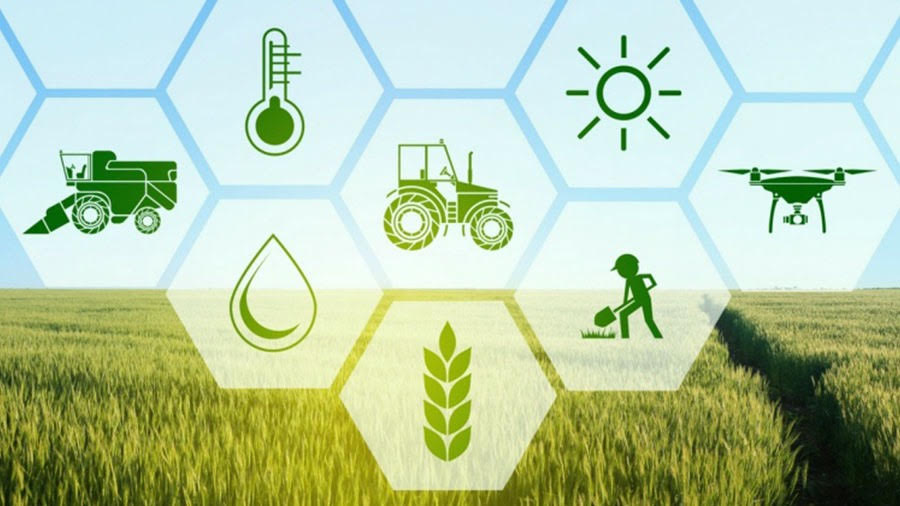India’s Climate-Sensitive Agriculture Requires Pioneering Technology for Advancement in Agricultural Practices

India’s Climate-Sensitive Agriculture Requires Pioneering Technology for Advancement in Agricultural Practices
Emerging interventions like satellite technology for the financial inclusion of farmers, rapid soil testing machines and gene-edited climate-resilient seeds are paving the way for a more sustainable farming future.
23 April 2024
Agricultural technology, known as Agri-Tech, is reforming Indian agriculture by tackling various challenges. Emerging interventions like satellite technology for the financial inclusion of farmers, rapid soil testing machines and gene-edited climate-resilient seeds are paving the way for a more sustainable farming future, and agriculturally sustainable practices which do not endanger the harvest or the crop quality.
In India, farmers are particularly sensitive to weather changes. These changes not only deteriorate the crop but also bring farmers under distress regarding their economic well-being. However, predicting rainfall and weather patterns has become increasingly difficult with ongoing fluctuations due to global warming. With the country’s population expected to reach 1.7 billion by 2050 and rising food demand, agriculture must become less reliant on climatic conditions and embrace cutting-edge tech solutions. This can shift this dependency and take off some load from farmers, agriculturalists, horticulturalists and the crop.
Agri-Tech aims to address numerous agricultural challenges, including low productivity, climate resilience, soil infertility and low incomes. These challenges are further exacerbated by factors such as economic conditions, technological infrastructure and regional agricultural policies. Without the support of institutions to approve and facilitate these innovations at the ground-working level, these tech advancements will be unable to help solve problems or will be irregularly distributed and create additional challenges.
Engineering Climate-Resilient Seeds: These battle fluctuations and unpredictability in weather. Modern-day rice, originating from wild rice, faces significant environmental stresses due to climate change. In contrast, millets, which evolved from the same grass family, have developed traits that enable them to thrive in harsher conditions with less water. Researchers at The Millet Lab, University of Hyderabad, are studying these traits to engineer climate-resilient seeds through gene-editing technology, which edits the genes of seeds after studying their patterns and codes.
Unlike genetically modified organisms or seeds (GMOs), gene editing does not introduce foreign genes but manipulates existing ones to enhance resilience to stressors like drought and heat, and incorporate the factors wanted in the seed.
Biotechnology researchers emphasise the urgent need to speed up the introduction of gene-edited seeds into the market as other types take a long time. While several institutions are working on developing these seeds, commercialization is pending until biosafety concerns are adequately addressed, as outlined in India’s Guidelines for the Safety Assessment of Genome Edited Plants. Promoting collaboration and ethical considerations in the scientific community is crucial for advancing agricultural biotechnology.
Platforms like the G20 summits which take place annually should prioritise knowledge-sharing and technological collaboration to boost agricultural productivity, particularly in developing countries. It is essential to ensure that gene-edited crops undergo rigorous safety assessments to mitigate environmental and human health risks if any.
Rapid Soil Testing for Informed Decision-Making: Krishitantra, an Agri-Tech startup, has developed Krishi-RASTAA, a rapid soil testing machine in collaboration with research institutions. This innovation allows farmers to obtain a comprehensive soil health report within 30 minutes, enabling informed decisions regarding soil management and crop selection. Utilising advanced technologies like machine learning and artificial intelligence (AI), Krishi-RASTAA assesses key soil parameters and provides recommendations for improving soil health. Real-time soil testing systems empower farmers to implement proactive soil management strategies, ultimately leading to enhanced crop yields. Earlier the soil testing methods were time consuming, although, these are yet to be largely commercialised.
Harnessing Satellite Data for Financial Inclusion: Satellite data is revolutionising financial inclusion in agriculture by providing crucial information for lending and insurance decisions. Startups like SatSure utilise satellite data to assess farm productivity, enabling banks to make informed loan decisions based on objective criteria such as crop yield and climatic risks. This technology not only accelerates loan processing for banks but also facilitates insurance claims processing for agricultural losses due to diseases or extreme weather events. Moreover, satellite data assists governments in disaster management and policy development by providing accurate information on crop damage and agricultural productivity.
The Challenges and Way to Adopt
Despite advancements in Agri-Tech, the adoption of these technologies remains uneven across India. Factors such as agricultural practices, economic conditions, technological infrastructure and regional policies influence farmers’ uptake of agritech solutions. Some of them are not even aware of whether these technologies exist. Addressing gender disparities in access to technology is another challenge. Women in rural areas, in particular, face barriers to accessing mobile phones and essential services, hindering their participation in the Agri-Tech revolution.
Agri-Tech innovations hold immense potential for empowering Indian farmers and enhancing agricultural sustainability. To ensure widespread adoption, it is essential to address technological, infrastructural and policy-related challenges while promoting collaboration and inclusivity in the agricultural sector.









